Catherine Robb
Research Assistant / Imperial College London
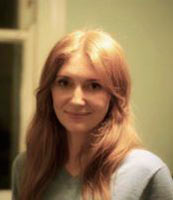
Catherine Robb is a PhD student and Research Assistant at Imperial College London; Neuroepidemiology and Ageing Research Unit. Her research is primarily exploring the role of physical activity in maintaining cognitive health in older age. More specifically, she is evaluating how physical activity interacts with established genetic, imaging and fluid biomarkers of Alzheimer’s disease in reducing likelihood of cognitive decline and eventual dementia.
She is conducting a deeper investigation of the underlying biomechanisms associated with these processes including the exploration of certain neurotrophic factors and molecular pathways. Coming from a psychological background, Catherine initially joined the department as an assistant psychologist supporting the coordinating of a large cohort observational study exploring early indicators of dementia and identifying sensitive cognitive assessments for detection of the earliest stage of cognitive decline.
Enrico Premi
Clinical neurologist / University of Brescia (Italy)
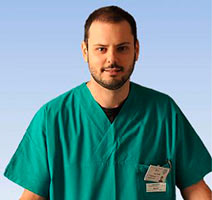
Dr. Premi attended medical school at the University of Brescia (Italy) and completed his residency program in Neurology at University of Brescia (Prof. Padovani) in 2012. He currently has a permanent contract as clinical neurologist in the Stroke Unit, ASST “Spedali Civili” (Brescia, Italy), continuing his research activity in collaboration with the Neurology Unit, Department of Clinical and Experimental Sciences, University of Brescia.
Since his residency period Dr. Premi’s research interests concern neurodegenerative diseases, in particular Frontotemporal Dementia (FTD) taking advantage of advanced neuroimaging techniques to explore structural and functional correlates of the disease. In the last five years he focused on the preclinical phase of FTD (studying presymptomatic carriers of FTD causative mutations) as well as on neuroanatomical correlates of Cognitive Reserve in FTD.
Arfan Ikram
Professor and chair of Epidemiology / Erasmus MC Rotterdam
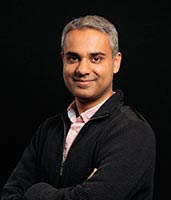
Prof. Ikram is Professor and Chair of Epidemiology at the department of Epidemiology, Erasmus MC Rotterdam, the Netherlands. He is also adjunct professor of Epidemiology at the Harvard Chan School of Public Health.
Prof. Ikram is principal investigator of the Rotterdam Study and a key collaborator in the CHARGE (Cohorts for Heart and Aging Research in Genomic Epidemiology) consortium. His research focuses on investigating the etiology of neurologic diseases in the elderly, with a particular focus on dementia, Alzheimer disease and cognitive decline. The main areas of research are to elucidate the earliest signs of brain diseases, before clinical symptoms are present, and to understand how these lead to clinical manifestation of disease. Moreover, he is interested in preclinical signs that can be used to identify persons at highest risk of developing disease. To this aim he has used data from the large population-based Rotterdam Study that has followed nearly 15,000 persons for a period of nearly 30 years. A main focus on his research has been the use of multiple modalities to capture various aspects of healthy raging, reserve, and brain damage. These include MRI-imaging, cognitive testing, motor testing, and various -omics technologies. He has published over 650 international scientific papers (H-index = 71) and currently heads a research group of 7 PhD-students, 2 post-docs, 3 MSc-students, and 5 research staff.
Robert Perneczky
Professor of Translational Dementia Research / Ludwig Maximilian University Munich (LMU)
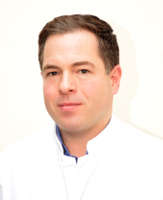
Robert Perneczky was appointed in 2016 Professor of Translational Dementia Research at the Ludwig-Maximilians-Universität (LMU) Munich and Head of the Division of Mental Health in Older Adults at the University Hospital of LMU. He also serves as principal investigator and group leader at German Center for Neurodegenerative Disorders (DZNE) and associate investigator at the Cluster for Systems Neurology (SyNergy) Munich. He also conducts research at Imperial College London and until recently served as Co-director of the Neuroepidemiology and Ageing Research Unit at the School of Public Health. He is a board registered specialist in general adult and geriatric psychiatry in both Germany and the United Kingdom.
He studied medicine at the Technische Universität and LMU Munich and completed his training in psychiatry, psychotherapy and geriatric medicine in 2009, with research sabbaticals at New York University Center for Brain Health in 2006 and University of Cambridge, Department of Clinical Neurosciences in 2009. He holds medical and research doctorates from Technische Universität Munich and a business degree (MBA) from Warwick Business School.
Eider Arenaza-Urquijo
Research Scientist / Barcelonabeta Brain Research Center (Barcelona)

Dr. Arenaza-Urquijo is a research scientist at Barcelonabeta Brain Research Center (Fundació Pasqual Maragall, Barcelona, Spain). Her research focuses on understanding the brain mechanisms and lifestyle factors underlying resilience to aging and Alzheimer's disease combining multimodal imaging (MRI and PET), lifestyle and neuropsychological assessments. Her contributions to the field include (1) assessment of the effects of education as well as late-life cognitive and physical activities o brain structure and function and Alzheimer’s disease pathologies, (2) identification of imaging markers of resilience at older ages, and (3) development of research frameworks to study resilience and reserve.
Dr. Arenaza-Urquijo obtained her PhD at the University of Barcelona (2013) and performed her postdoctoral research at the National Institute of Health and Medical Research, France (2013-2015, 2017-2018). In 2016, she was a Visiting Scientist at the University of California (Berkeley, California, US) and in 2018, she was a Research Fellow at Mayo Clinic (Rochester, Minnesota, US). Dr. Arenaza-Urquijo co-led a Horizon 2020 European project aiming at improving brain and mental health in the aging population (2015-2018). She is currently Chair of the Scientific Advisory Group “lifestyle and non-pharmacological interventions” of European Prevention of Alzheimer’s disease (EPAD) Consortium. She has been actively involved in the professional area of interest "Reserve, resilience and protective factors" since its starts as Programs Co-Chair.
Yaakov Stern
Professor of Neuropsychology / Columbia University College
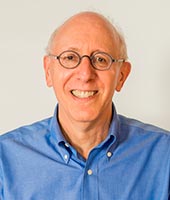
Yaakov Stern is Professor of Neuropsychology in the Departments of Neurology and Psychiatry, as well as the Taub Institute for the Research on Alzheimer’s Disease and the Aging Brain, at Columbia University College of Physicians and Surgeons. He is chief of the Cognitive Neuroscience Division of the Department of Neurology.
Dr. Stern’s research approach includes classic neuropsychological and cognitive experimental techniques, with a strong focus on functional imaging. He focuses on cognition in normal aging and in diseases of aging, particularly Alzheimer’s disease. One strong focus of his research is investigating the neural basis of cognitive reserve.
Amos D. Korczyn
Chairman of the Scientific Medical Board / Israeli Alzheimer’s disease association (EMDA)
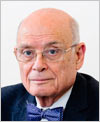
Professor Korczyn graduated from the Hebrew University–Hadassah Medical School in Jerusalem in 1966 (MD), where he also received an MSc degree in pharmacology (cum laude) in 1966. He trained in neurology at Beilinson Hospital and at the National Hospital for Nervous Diseases, Queen Square, London. He was the Chairman of the Department of Neurology at the Tel-Aviv Medical Center from 1981 until 2002, and the incumbent of the Sieratzki Chair of Neurology at Tel-Aviv University, 1995-2010. Professor Korczyn has a particular interest in neurodegenerative diseases. He has authored or co-authored over 600 articles in peer-reviewed journals, as well as many chapters in books. He edited several books and Special Issues in Journals, and is Regional Editor of the Journal of Alzheimer’s Disease. He is or has been an Editorial Board member of 20 international journals, and organized several neurological conferences, mainly in the field of dementia, Parkinson’s disease and other degenerative brain disorders, as well as CONy – the International Congress on Controversies in Neurology, and has organized the Mental Dysfunction in Parkinson’s disease congresses since 1993. Professor Korczyn served on advisory boards in several drug discovery programs.
Professor Korczyn is the Chairman of the Scientific Medical Board of the Israeli Alzheimer’s disease association (EMDA), member of the SAB of Alzheimer Disease International (ADI), and has been the chairman of the WFN Research Committee for Clinical Neuropharmacology.
Professor Korczyn is an honorary member of the neurological societies of Israel, Serbia, Poland and Russia. Professor Korczyn’s H-index is 63.
Gerd Kempermann
Professor / Center for Regenerative Therapies Dresden (CRTD)
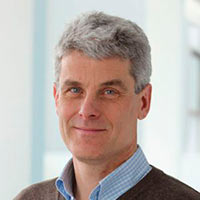
Gerd Kempermann, born in 1965, studied Medicine in Cologne and Freiburg, Germany. From 1995 to 1998 he was postdoctoral fellow with Fred H. Gage at the Salk Institute and between 2000 and 2007 group leader at the Max Delbrück Center for Molecular Medicine (MDC) Berlin-Buch.
Since 2007 he is Professor at the CRTD – Center for Regenerative Therapies Dresden. Since 2009 he is also speaker of the German Center for Neurodegenerative Disease (DZNE) Dresden. Main topics of his work are the function and activity-dependent regulation of adult hippocampal neurogenesis and how both interact in health and disease.
Michael Ewers
Professor / Ludwig Maximilian University Munich (LMU)
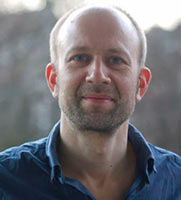
Michael Ewers’ research focuses on neuroimaging-assessed brain changes in Alzheimer’s disease, based at the Institute for Stroke and Dementia Research (ISD). The major research interest is to understand structural and functional network changes that accelerate or delay the onset of dementia symptoms. For reserve, a major approach is to use graph theoretical analysis to both resting state and task-based MRI in order to identify functional brain changes that underlie higher resilience of cognitive abilities during the course of Alzheimer’s disease. The identification of such protective brain mechanism are sought to be targeted by therapeutic intervention in secondary prevention of Alzheimer’s disease.
Michael is a professor at the Ludwig-Maximilian-University Munich (LMU) since 2012, after research stays at Trinity College Dublin, Ireland and University of California at San Francisco (USCF), USA.
Richard Lathe
Professor / University of Edinburgh
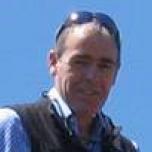
Richard Lathe graduated from Edinburgh and Brussels, and after postdoctorals in Heidelberg and Cambridge has held professorships in France, UK, and Russia. He has worked extensively on developing a wild animal vaccine against rabies, produced the first transgenic sheep, and has been active in molecular technologies, autism, and in theories concerning the origin of life. He is coauthor of the position statement 'Microbes and Alzheimer Disease' (2016) and of the 'Antimicrobial Protection Hypothesis' (2018).
Current research focuses on the potential infectious etiology of human disease including Alzheimer disease, the function of the mammalian hippocampus, and the evolutionary basis of host–pathogen interactions, with special reference to anxiety/depression, as well as to the possibility that antiviral medication might defer the development of Alzheimer disease.
Tim Bartels
University College London / Assistant Professor at Brigham Hospital
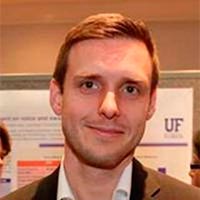
Dr. Tim Bartels is currently leading the program “Structure-Function Relationship in Neurodegeneration” at the Dementia Research Institute at the University College London in addition to his position as an Assistant Professor of Neurology at Brigham & Women’s Hospital and Harvard Medical School. He received his Master’s Degree in Chemistry at the Technical University Munich and conducted his PhD in Biophysics at the Adolf Butenandt Institute (Director Christian Haass) at the Ludwig-Maximilian University under the official supervision of Prof. Johannes Buchner (Technical University Munich).
He continued his post-doctoral training with Dennis Selkoe at Brigham & Women’s Hospital and Harvard Medical School where he also accepted his first faculty position as Instructor and later Assistant Professor of Neurology. His lab is dedicated to the involvement of the different forms of the presynaptic protein alpha-synuclein in Parkinson’s Disease and Dementia with Lewy Bodies. Furthermore, is his lab interested in novel context specific pathways of protein folding/misfolding and the involvement of lipids in neurodegeneration.
Timo Grimmer
Psychiatrist, associate Professor / Rechts der Isar Hospital, TUM
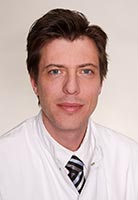
Prof. Dr. Timo Grimmer is a board-certified psychiatrist and an Associate Professor working as a Specialist Registrar at the Department of Psychiatry and Psychotherapy, Rechts der Isar Hospital, Technical University of Munich, Germany.
Dr Grimmer is head of the Centre for Cognitive Disorders, which specializes in early and differential diagnosis of patients with cognitive impairment.
The main focus of his research is assessing the usefulness of imaging techniques in predicting neurocognitive disorders. He has authored numerous peer reviewed articles, amongst others the first studies that assessed the utility of amyloid PET for differential diagnosis of neurodegenerative diseases and to track Alzheimer’s disease progression (>700 impact points, H-index: 26). In addition, he served as a national coordinating investigator and as a principal investigator in more than 50 drug trials including all monoclonal antibodies against cerebral amyloid load so far.
Alkomiet Hasan
Professor of Psychiatry and Psychothreapy / University Hospital Munich
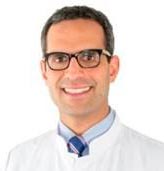
Professor Alkomiet Hasan is the Deputy Director of the Department of Psychiatry and Psychothreapy at the University Hospital Munich. His clinical work focuses on the differential diagnosis and treatment of non-affective psychoses (schizophrenia, bipolar disorder), affective disorders (e.g. depression), somatic-psychiatric disorders (e.g. organic psychiatric disorders) and comorbid addiction disorders.
The core areas of his scientific work are the planning and implementation of innovative Phase II to IV clinical studies, the development of treatment guidelines, patient care research and systematic neurosciences. His is responsible fort he international WFSBP guidelines schizophrenia and the national schizophrenia guideline in Germany.
Jochen Herms
Professor for Neuropathology / University of Munich
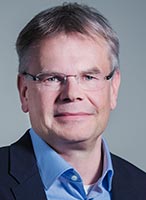
Jochen Herms, born in 1963, studied Medicine in Hamburg, Germany. From 1991 to 1993 he was postdoctoral fellow with Otto Creutzfeldt at the Max-Planck Institut für Biophysikalische Chemie, Göttingen and between 1994 and 1999 resident at the department of Neuropathology Göttingen University with Hans Kretzschmar.
Jochen Herms is Professor for Neuropathology and chair of the Center of Neuropathology and Prion Research at the University of Munich, as well as head of the department of translational brain research at the German Center for Neurodegenerative Disease (DZNE) Munich. Together with Peter Falkai he leads the Neurobiobank Munich – the largest collection of human brain tissue for research on neurodegenerative diseases in Germany.
Together with his group he mainly works on the mechanisms of synaptic failure in neurodegenerative diseases and the identification and validation of new diagnostic and therapeutic approaches aimed at modifying disease progression at an early stage.
Amos Korczyn
Professor, Chairman of the Israeli Alzheimer's disease association (EMDA)
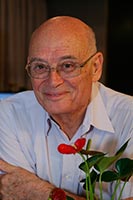
Professor Korczyn graduated from the Hebrew University–Hadassah Medical School in Jerusalem in 1966 (MD), where he also received an MSc degree in pharmacology (cum laude) in 1966. He trained in neurology at Beilinson Hospital and at the National Hospital for Nervous Diseases, Queen Square, London. He was the Chairman of the Department of Neurology at the Tel-Aviv Medical Center from 1981 until 2002, and the incumbent of the Sieratzki Chair of Neurology at Tel-Aviv University, 1995-2010. Professor Korczyn has a particular interest in neurodegenerative diseases. He has authored or co-authored over 600 articles in peer-reviewed journals, as well as many chapters in books. He edited several books and Special Issues in Journals, and is Regional Editor of the Journal of Alzheimer's Disease. He is or has been an Editorial Board member of 20 international journals, and organized several neurological conferences, mainly in the field of dementia, Parkinson’s disease and other degenerative brain disorders, as well as CONy – the International Congress on Controversies in Neurology, and has organized the Mental Dysfunction in Parkinson's disease congresses since 1993. Professor Korczyn served on advisory boards in several drug discovery programs.
Professor Korczyn is the Chairman of the Scientific Medical Board of the Israeli Alzheimer's disease association (EMDA), member of the SAB of Alzheimer Disease International (ADI), and has been the chairman of the WFN Research Committee for Clinical Neuropharmacology.
Professor Korczyn is an honorary member of the neurological societies of Israel, Serbia, Poland, Russia, and Romania.
Pierre-Jean Ousset
Head of Gerontopole Clinical Research Center
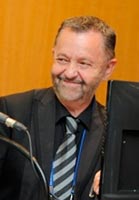
From the beginning of his neurology studies at the University of Toulouse, Dr. Pierre-Jean Ousset directed to the field of dementia and Alzheimer's disease. Initially trained in neuropsychology, he worked in the Gerontopole team alongside Prof. Bruno Vellas, helping to set up care and research structures on neurodegenerative diseases. Currently in charge of the Gerontopole Clinical Research Center, he is involved as Investigator, Principal Investigator or National Coordinator in all clinical trials for the treatment or prevention of dementia and cognitive decline.
Dr. Ousset is an active member of the European Alzheimer's Disease Consortium, member of the scientific committees of the GUIDAGE study and MAPT study (5-year placebo controlled prevention trial of omega 3 fatty acids associated with multidomain intervention). He is also a member of the scientific committee of MEMENTO-cohort in the frame of French National Alzheimer Plan.
Dr. Ousset is currently the Coordinator of the French Network for Clinical Trials in AD and is co-National Lead of the EPAD-consortium (National Coordinating Center).
Stefan Lichtenthaler
Professor of proteomics / TUM, DZNE
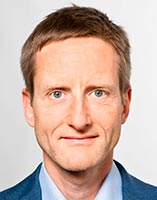
Stefan Lichtenthaler studied chemistry at the Universities of Karlsruhe, Montpellier (France) and Heidelberg. He earned his doctoral degree at ZMBH, Heidelberg University’s Center for Molecular Biology.
After working as a postdoctoral researcher at Harvard University (USA) he led a junior research group at LMU Munich where he also acquired his postdoctoral teaching qualification (habilitation) for his work in the field of biochemistry.
In 2009 he was appointed head of department at DZNE, the newly established German Center for Neurodegenerative Diseases. Since 2012 he has been full professor of proteomics at TUM and DZNE.
Oliver Wirths
Department of Psychiatry / University Medical Center Göttingen
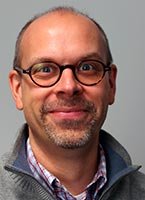
Oliver Wirths’ current research interests cover the neuropathology of degenerative dementias with a focus on the pathogenesis of Alzheimer's disease (AD).
Main topics of his work are the development and characterization of transgenic AD mouse models, the impact of truncated amyloid-ẞ species in the disease process, as well as modulation and prevention of neuronal loss in AD transgenic mice.
He is an Associate Professor at the Department of Psychiatry at the University Medical Center Göttingen and studied Biology in Bonn and Leuven.
Jan Häckert
Alzheimer Therapy and Research Center / Ludwig Maximilian University Munich (LMU)
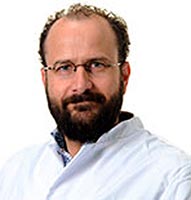
Jan Häckert graduated from LMU Munich and started his clinical education in the Department of Neurology of Bogenhausen Hospital in Munich. He completed his neurological education with the psychiatric year at the Department of Psychiatry at the LMU Munich where he continued psychiatric education until today. He is a clinical neurologist and psychiatrist.
Jan Häckert´s research focusses on transcranial stimulation methods and their physiological induced effects in healthy individuals and in older aged healthy and cognitive impaired people. He is working in cooperation with the neurological und neurosurgical department of LMU Munich where he investigates patients with Parkinson’s disease, who are evaluated and scheduled for deep-brain stimulation.
Cécilia Samieri
Researcher / Bordeaux Population Health Research Center
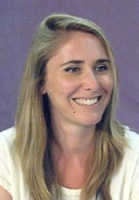
After a doctorate in veterinary medicine, Cécilia Samieri obtained a doctorate in epidemiology from the University of Bordeaux (France) in 2009, and then trained as a postdoctoral fellow at the Channing Division of Network Medicine, Harvard Medical School (Boston, USA). Back in France, she joined INSERM (French National Institute for Health) as a permanent researcher in 2015, in the Bordeaux Population Health Research Center, INSERM U1219.
Cécilia Samieri's research focuses on the epidemiology of brain aging, with the main objective of understanding how environmental factors, including nutrition and cardiometabolic health, influence the etiology of age-related brain diseases, such as dementia and its leading cause, Alzheimer's disease. She has worked on several large cohorts on dementia and cognitive decline, with the objective of studying with a holistic vision the influence of lifestyle on brain health, from overall lifestyle patterns (eg, dietary patterns) to molecular markers of the exposome. Cécilia Samieri has led several projects on the environmental risk factors of Alzheimer's disease, and she is academic co-chair of the Alzheimer’s Association's Professional Interest Area group on Nutrition and Metabolic Diseases.
Matteo Bauckneht
Nuclear Medicine physician / San Martino Hospital Genoa
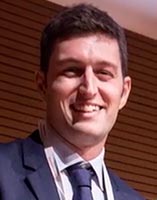
Matteo Bauckneht is a nuclear medicine physician at IRCCS Policlinico San Martino, University of Genoa, Italy. He has experience in performing and reporting brain metabolic PET and perfusion and receptorial SPECT studies. The high-level tradition of Nuclear Neurology leaded by Professor Silvia Morbelli in the University of Genoa and the strict collaboration with Neurophysiology Unit leaded by Professor Flavio Nobili gave him the opportunity to be exposed to complex clinical cases in a multidisciplinary context.
His research activity in nuclear neurology is mainly focused on the use of brain FDG PET to investigate cognitive function and impairment in different neurodegenerative disorders (Alzheimer’s Disease, Parkinson’s Disease, Amyotrophic Lateral Sclerosis etc). He is an active member of the Neurology group of the Italian Association of Nuclear Medicine (AIMN).
Rik Henson
Professor of Cognitive Neuroscience / University of Cambridge
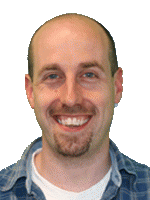
Rik Henson is a UK MRC Programme Leader, Professor of Cognitive Neuroscience, and Deputy Director at the MRC Cognition and Brain Sciences Unit of the Department of Psychiatry at the University of Cambridge.
His primary interest concerns how the brain "remembers" things. Specifically, he uses the techniques of fMRI and EEG/MEG to examine brain activity as healthy volunteers try to remember things in the laboratory, and relate these findings, via computational modelling, to the memory problems following damage in those brain regions. He is interested in the neural bases of both explicit (conscious) memory and implicit (unconscious) memory, particularly the relationship between recollection, familiarity, and priming, and the relationship between memory and (visual) perception. A deeper knowledge of these different expressions of memory is important for understanding the ubiquitous memory impairments associated with neurological damage, neurodegenerative diseases such as dementia, and normal ageing.
Chi Udeh-Momoh
Neuroscientist / Imperial College London

Dr Chi Udeh-Momoh is a Neuroscientist with affiliations at Imperial College London, UK and University of Bristol, UK. She is co-Investigator and Programme Manager of a large-scale dementia-prevention preclinical cohort study (The Chariot:PRO study) that will follow-up an estimated 1,200 pre-symptomatic-for–AD individuals (up to 4 years), with extensive fluid and imaging biomarkers, neurocognitive and functional explorations.
Having completed a competitive CASE PhD studentship in Neuroscience and Neuroendocrinology at the Translational Brain Sciences department and MRC Centre for Synaptic Plasticity at the University of Bristol, her current research focuses on the brain-immune-endocrine system interplay in the aetiology and pathophysiology of neurocognitive disorders, particularly Alzheimer’s disease. She uses translational research methodologies to address gaps in current understanding of underlying factors involved in manifestation of pathology and resultant presentation of clinical symptoms, primarily in the context of brain and cognitive reserve-related mechanisms.
Panos Alexopoulos
Assistant Professor / University of Patras
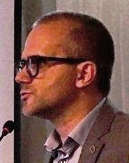
Dr. Alexopoulos practices old age psychiatry at the University Hospital of Patras and is involved as adjunct professor in the teaching activities of the Faculty of Medicine of the Technical University of Munich (TUM), where he obtained his PhD and completed his «Habilitation» (German postdoctoral degree program).
His current research focus encompasses early diagnosis and pathogenesis of old-age mental disorders, in particular neurodegenerative cognitive disorders.
Nicolai Franzmeier
Institute for Stroke and Dementia Research (ISD)
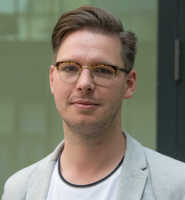
Nico studied Psychology and Medicine in Innsbruck, Austria, after which he returned to Munich where he obtained his PhD at the Graduate School of Systemic Neurosciences in 2017 under the supervision of Michael Ewers at the Institute for Stroke and Dementia Research (ISD).
In his research, he employs multimodal imaging to study neural mechanisms of reserve & resilience in Alzheimer’s disease, where he discovered that functional hubs of the fronto-parietal control network promote resilience against the impact of Alzheimer’s disease pathology on cognition.
He now works as a Post-Doc at the ISD where he recently started to also focus on genetic determinants and spreading mechanisms of tau pathology, as well as the role of microglia activation in the progression of Alzheimer’s disease.
Shireen Sindi
Assistant Professor at Karolinska Institute
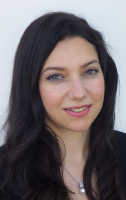
Dr. Shireen Sindi is Assistant Professor at Karolinska Institute, Division of Clinical geriatrics, Department of Neurobiology, Care Sciences and Society (NVS). She has made key contributions on risk factors for cognitive decline and dementia, including stress, sleep and biological markers, with evidence from normal aging to Alzheimer’s disease. She investigates the associations between sleep disturbances and various outcomes including dementia, cognitive impairment, MRI correlates and multimorbidity.
She has also developed an expertise on dementia lifestyle preventive interventions, and published on the underlying biological mechanisms (telomere length) in a multidomain lifestyle intervention (the FINGER trial). She is scientific & research coordinator for: 1) Multi-Center Sleep Study, 2) Multimodal preventive trials for Alzheimer's Disease (MIND-AD); 3) Multimodal strategies to promote a healthy brain in aging: Innovative evidence-based tools (MULTI-MODE); 4) Cortisol & Stress in Alzheimer’s disease (Co-STAR) projects. She is also actively involved in supervision, teaching & several academic activities.